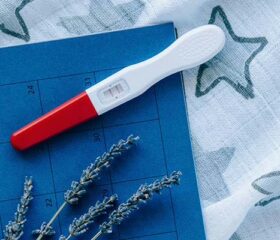How to Get Pregnant with Irregular Periods: Tracking and Fertility Tips
For would-be mothers, an erratic cycle can be a big source of anxiety. It’s true that irregular periods can make things difficult when you’re trying for a baby, but don’t lose hope—you’ll just have to be a bit more patient and persistent than if your periods came with clockwork-like regularity.

This article will cover everything you need to know about irregular periods so you can take control of your cycle and fertility. Read on for more.
What are irregular periods?
The average menstrual cycle totals about 28 days (with day one being when your period comes—the day you start bleeding). Minor fluctuations here and there are common, but a cycle is considered “irregular” when it falls outside the range of 24 to 38 days. 1
Irregular cycles can take many forms. Sometimes, a cycle being irregular just means your period will arrive at an unpredictable time, but it’ll still come more or less every month. Other times, it may mean going for a long stretch without a period at all and then getting one unexpectedly.
Common causes of irregular periods and ovulation problems
One of the main causes of irregular periods is stress. Whether that comes in the form of workplace drama, family issues, financial setbacks, or something else, life’s ups and downs can take a toll on your hormones and throw your cycle off. 2
There are also several health problems that can cause an irregular cycle, which range from mild to serious. Some of the most common suspects include:
- Weight issues: Being significantly underweight or overweight can throw your hormones off balance and affect your menstruation and ovulation. 3
- Thyroid issues: When your thyroid is underactive (hypothyroidism) or overactive (hyperthyroidism), it can affect your hormonal regulation. Other symptoms of thyroid issues include mental fuzziness, weight changes, hair loss, and constipation. 4
- Polycystic ovary syndrome (PCOS): Although you can get pregnant with PCOS, this hormonal disorder can complicate your understanding of your reproductive health by causing irregular periods, ovarian cysts, and elevated androgen levels (testosterone) in your system. 5
- Primary ovarian insufficiency (POI): This is a condition in which your ovaries stop working before you hit 40. You’ll experience irregular or no periods, low estrogen, and other symptoms like vaginal dryness, hot flashes, and mood changes. 6
- Perimenopause: When you approach menopause, your estrogen and progesterone levels will naturally decline, leading to irregular cycles and ovulation. This transition lasts 2–8 years and makes getting pregnant more difficult. Expect symptoms like frequent urination, night sweats, and insomnia. 7
This list isn’t exhaustive, and there are other health issues that can cause menstrual irregularity, including certain types of diabetes.
Should you see a doctor about irregular periods?
It’s OK to shrug off the occasional deviation from your ordinary cycle due to temporary factors like stress, travel, or changes in your exercise routine. However, if your cycle is consistently irregular or you see any other concerning signs, you should see a doctor to rule out the more serious issues listed above.
You should definitely get medical attention if any of the following sound familiar: 8
- Your period has been MIA for two or more months.
- When you do get your period, your menstrual bleeding lasts for more than a week.
- You saturate a pad or tampon with blood every 1–2 hours.
- You have severe period pain.
- You’ve tried unsuccessfully to get pregnant for a year (if you’re under 35) or six months (if you’re 35 or older). 9
How irregular periods affect your ability to conceive
Ovulation happens when your ovary drops a mature egg, which is necessary for you to get pregnant. An irregular cycle makes it hard to predict when ovulation will occur, which in turn makes it harder to conceive.
When you have irregular periods, you might not ovulate every month at all, or you may find that it happens at different times each cycle. Adding to the confusion, you can get your “period” without ovulating (although that isn’t considered menstruation), and the reverse is also true: you can ovulate without getting your period. 10
Even if you manage to get pregnant, it can be much harder to spot the signs of pregnancy when you have irregular periods. A missed period is often the first pregnancy symptom for many women, but if that’s normal for you, it can be tricky to tell that you’ve conceived.
Treatment options and tips for getting pregnant with irregular cycles
When your periods aren’t playing nice, tracking your cycle can feel like a guessing game. Fortunately, there are ways to manage irregular periods and improve your chances of conceiving.
How to detect ovulation when you have irregular cycles
If you have irregular cycles, it can be hard to predict when you’re due to ovulate. Using an ovulation calculator can help, and there are also several other methods you can use to track ovulation with irregular periods. The first three can be done at home, whereas the last requires visiting a doctor.
- Ovulation test strips: You can use an ovulation test strip (also known as an ovulation predictor kit or OPK) to spot spikes in something called the “luteinizing hormone” (LH), as an LH surge occurs 24–48 hours before you ovulate. (Note that, because LH is similar to the hormone that pregnancy tests check for, ovulation tests can also be positive if you’re pregnant already, although you shouldn’t use one as a substitute for a real pregnancy test.) 11
- Basal body temperature (BBT) charting: You can also sometimes get a handle on an irregular cycle by tracking your basal body temperature. There may be a subtle uptick after ovulation. 12
- Cervical mucus monitoring: If you see clear, stretch, egg-white-like mucus after wiping, that can also be one of the signs of ovulation. 13
- Transvaginal ultrasound and blood work: This method can’t be done at home. If you’re really struggling, doctors can use ultrasound imaging and blood tests to determine if and when you’re ovulating. 14
You aren’t limited to just one method, of course—combining multiple will give you a more complete picture of your cycle. If tracking everything separately sounds too much like a hassle, you can use an ovulation tracker app to condense all of this info into charts and calendar displays.
You should also consider scheduling a preconception appointment with your doctor to help you understand your ovulation more.
Lifestyle adjustments to regularize your cycle
As mentioned, sometimes irregular periods are caused by medical issues, which you can’t (and shouldn’t) treat on your own. However, sometimes, they’re caused by lifestyle factors.
If you maintain a healthy weight, adopt a regular exercise routine (without overdoing it), and eat a balanced diet, you may find that your periods come more regularly. On the latter point, if you’re trying to get pregnant, be sure to add nutritious foods that can boost fertility to your diet, such as leafy greens or avocados.
Also, make time for relaxing activities, like meditating or walking in nature. It’s important not to dismiss the role that stress can play in your hormonal cycle.
Medical interventions for irregular periods
As mentioned, if your irregular periods have persisted for a while, it’s worth seeing a doctor. Even if it turns out that there’s nothing seriously wrong with you, a professional can work with you to root out the underlying cause behind your misbehaving cycle and tailor a treatment plan. This will make it much easier to conceive than if you keep trying to tackle this alone.
The treatment plan your doctor will recommend will depend on the likely cause of your irregular cycle. In some cases, they may prescribe you medication, possibly containing progestin (a man-made version of progesterone). 15
They may also try to address the root cause of your irregularity, if they think that’s feasible. For instance, if they suspect you have a nutritional deficiency, they’ll take a look at your diet with you and see if there are any adjustments you can make that may solve the problem.
Final thoughts
Again, irregular periods are frustrating. Know that you’re not alone and that your unruly cycle probably isn’t a deal-breaker on your path to parenthood.
If you’re struggling with this, be patient with yourself. Getting your cycle to regulate itself will take time, and the less pressure you put on yourself, the more likely it is that Mother Nature will smile on your efforts. Good luck!
Article Sources
- Office on Women's Health. "Period problems" Retrieved April 15, 2025.
- American Psychological Association. "Stress effects on the body" Retrieved April 15, 2025.
- Office on Women's Health. "Weight loss and women" Retrieved April 15, 2025.
- Brown Health University. "Thyroid Conditions in Women: Symptoms, Treatment and Care" Retrieved April 15, 2025.
- Johns Hopkins Medicine. "Polycystic Ovary Syndrome (PCOS)" Retrieved April 15, 2025.
- MedlinePlus. "Primary Ovarian Insufficiency" Retrieved April 15, 2025.
- Johns Hopkins Medicine. "Perimenopause" Retrieved April 15, 2025.
- UnityPoint Health. "Irregular Periods: When to See a Doctor" Retrieved April 15, 2025.
- Johns Hopkins Medicine. "Why Can’t I Get Pregnant?" Retrieved April 15, 2025.
- Women and Infants. "Understanding Anovulation: Causes, Diagnosis, and Treatment" Retrieved April 15, 2025.
- American Pregnancy Association. "How to Use Ovulation Kits & Fertility Monitors" Retrieved April 15, 2025.
- Kaiser Foundation Health Plan, Inc. "Basal Body Temperature (BBT) Tracking" Retrieved April 15, 2025.
- Time to Conceive. "Cervical Mucus Monitoring" Retrieved April 15, 2025.
- Scientific Reports. "Prediction of ovulation: new insight into an old challenge" Retrieved April 15, 2025.
- Eunice Kennedy Shriver National Institute of Child Health and Human Development. "What are the common treatments for menstrual irregularities?" Retrieved April 15, 2025.





